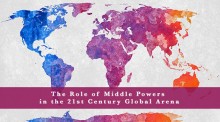Working with the Institute of International Relations at the University of Sao Paulo, the Canada Centre for Global Security Studies/Munk School of Global Affairs recently launched a major new collaborative research project: “The Role of Middle Powers in the 21st Century Global Arena.”
The project will unfold in the context of an overarching University of Toronto-University of Sao Paulo agreement designed to encourage research in four designated areas: neuroscience, oncology, global cities, and international relations.
Many years ago, Robert Keohane defined a middle power as “a state whose leaders consider that it cannot act alone effectively but may be able to have a systemic impact in a small group or through an international institution.” Other authors have described middle powers as status seekers who are willing to oppose “great power” hegemony – or as regional leaders, coalition builders, conflict managers, committed multilateralists, and users of soft rather than hard power. Intensive new attention to “middle powers” is now seen as necessary because of the way the international system has evolved in recent years – e.g., the increasing prominence of the so-called BRICS states and the G-20. Among the questions to be considered in the newly-launched research project: Are today’s “middle powers” really status seekers trying to balance great power influence? Do their international strategies aim at regional leadership? Do they privilege multilateral action and multilateral organization? Do they have an important role in building international coalitions? To what extent are they conflict managers and soft power users? To what extent do their geopolitical surroundings influence expected behaviors? To what extent do domestic politics influence their strategic international choices? And, indeed, what specific states should actually be included in the category (e.g., India, but not China?)?
In keeping with Munk School of Global Affairs practice, the key organizing role of Canadian and Brazilian scholars will segue into wide-ranging engagement with other global partners. At the November 15-16 Toronto workshop that launched the project, for instance, the Brazilian and Canadian delegations were joined by participants from Mexico, Germany, Turkey, India, and South Korea. Yet additional enrichment for initial knowledge-sharing and planning was provided by distinguished diplomats: Canada’s Ambassador to the United Nations, the Honourable Guillermo Rishchynski, offered a keynote address – and a roundtable discussion drew on the real-world experiences of former Minister of Foreign Affairs and International Trade Bill Graham, recently retired ambassador to Beijing David Mulroney, Germany’s Consul General in Toronto Walter Stechl, and Turkey’s Consul General in Toronto Ali Guney.
Photo Credit: Nicolas Raymond
